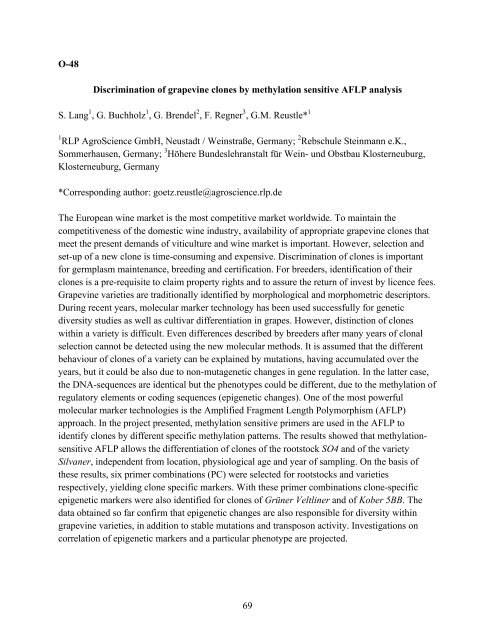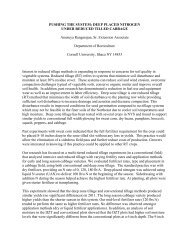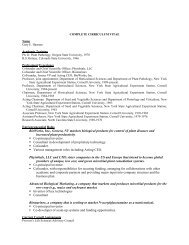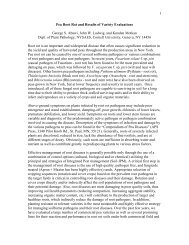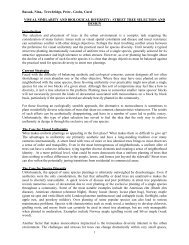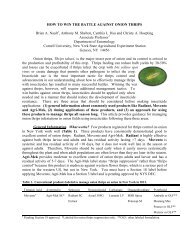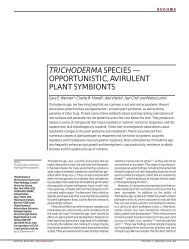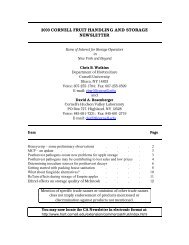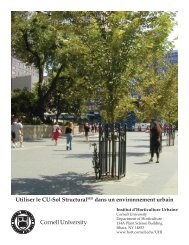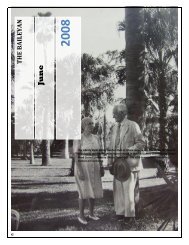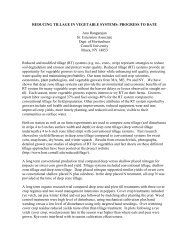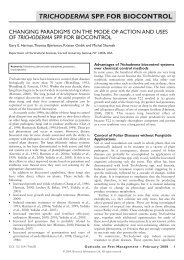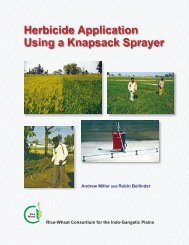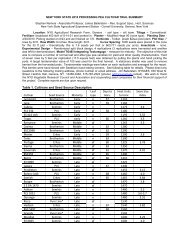conference schedule and program with abstracts - Horticulture ...
conference schedule and program with abstracts - Horticulture ...
conference schedule and program with abstracts - Horticulture ...
You also want an ePaper? Increase the reach of your titles
YUMPU automatically turns print PDFs into web optimized ePapers that Google loves.
O-48<br />
Discrimination of grapevine clones by methylation sensitive AFLP analysis<br />
S. Lang 1 , G. Buchholz 1 , G. Brendel 2 , F. Regner 3 , G.M. Reustle* 1<br />
1 RLP AgroScience GmbH, Neustadt / Weinstraße, Germany; 2 Rebschule Steinmann e.K.,<br />
Sommerhausen, Germany; 3 Höhere Bundeslehranstalt für Wein- und Obstbau Klosterneuburg,<br />
Klosterneuburg, Germany<br />
*Corresponding author: goetz.reustle@agroscience.rlp.de<br />
The European wine market is the most competitive market worldwide. To maintain the<br />
competitiveness of the domestic wine industry, availability of appropriate grapevine clones that<br />
meet the present dem<strong>and</strong>s of viticulture <strong>and</strong> wine market is important. However, selection <strong>and</strong><br />
set-up of a new clone is time-consuming <strong>and</strong> expensive. Discrimination of clones is important<br />
for germplasm maintenance, breeding <strong>and</strong> certification. For breeders, identification of their<br />
clones is a pre-requisite to claim property rights <strong>and</strong> to assure the return of invest by licence fees.<br />
Grapevine varieties are traditionally identified by morphological <strong>and</strong> morphometric descriptors.<br />
During recent years, molecular marker technology has been used successfully for genetic<br />
diversity studies as well as cultivar differentiation in grapes. However, distinction of clones<br />
<strong>with</strong>in a variety is difficult. Even differences described by breeders after many years of clonal<br />
selection cannot be detected using the new molecular methods. It is assumed that the different<br />
behaviour of clones of a variety can be explained by mutations, having accumulated over the<br />
years, but it could be also due to non-mutagenetic changes in gene regulation. In the latter case,<br />
the DNA-sequences are identical but the phenotypes could be different, due to the methylation of<br />
regulatory elements or coding sequences (epigenetic changes). One of the most powerful<br />
molecular marker technologies is the Amplified Fragment Length Polymorphism (AFLP)<br />
approach. In the project presented, methylation sensitive primers are used in the AFLP to<br />
identify clones by different specific methylation patterns. The results showed that methylationsensitive<br />
AFLP allows the differentiation of clones of the rootstock SO4 <strong>and</strong> of the variety<br />
Silvaner, independent from location, physiological age <strong>and</strong> year of sampling. On the basis of<br />
these results, six primer combinations (PC) were selected for rootstocks <strong>and</strong> varieties<br />
respectively, yielding clone specific markers. With these primer combinations clone-specific<br />
epigenetic markers were also identified for clones of Grüner Veltliner <strong>and</strong> of Kober 5BB. The<br />
data obtained so far confirm that epigenetic changes are also responsible for diversity <strong>with</strong>in<br />
grapevine varieties, in addition to stable mutations <strong>and</strong> transposon activity. Investigations on<br />
correlation of epigenetic markers <strong>and</strong> a particular phenotype are projected.<br />
69


